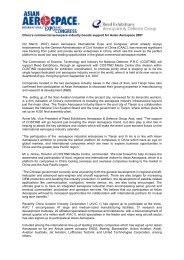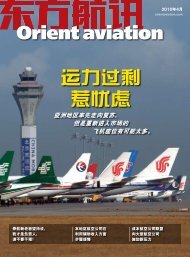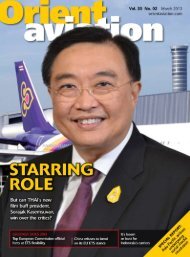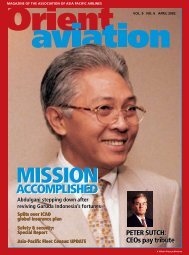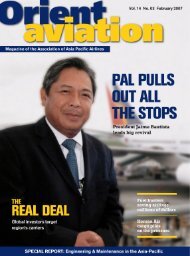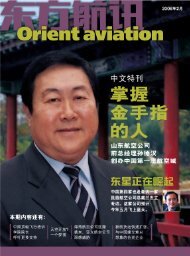LIFE AFTER SQ006 - Orient Aviation
LIFE AFTER SQ006 - Orient Aviation
LIFE AFTER SQ006 - Orient Aviation
- No tags were found...
Create successful ePaper yourself
Turn your PDF publications into a flip-book with our unique Google optimized e-Paper software.
British Airways: A dramatic reversal in fortunesfollowing the tragic crash of an Air FranceConcorde, BA grounded its own fleet of thesupersonic jets.Although Eddington will not commentpublicly about the Concorde issue with AirFrance because the investigation is ongoing,it is likely the BA Concorde fleet will be backin the air by spring.Eddington, who in March will take hisplace on the board of 25% BA-owned QantasAirways, is the consummate airline executive.He has fitted easily into his new surroundings.He says he enjoys the job tremendouslyand his Korean-born wife and two children are“very happy” with their new life in England.Any lingering suspicions about the newboss from Down Under have probably beendispelled by the hands-on, no nonsenseEddington style.“I have always regarded myself as anAustralian first and foremost, but I recognisethat I’m a gypsy,” he said.He lived in England for seven years in the1970s when he studied at Oxford Universityas a Rhodes scholar and then as a researchfellow. Later, when he joined Cathay Pacificat 29, he worked in Japan, South Korea andHong Kong before he moved to Melbourneto head Ansett in 1997.“If the acid test [on loyalties] is who do Ibarrack for when Australia plays England onthe cricket or the rugby field, it’s no contest,”said keen sportsman Eddington with a smile.“But although BA is a very British company insome ways, it is a global company in others.I think the days are gone when companieslike BA or Qantas Airways are run from avery narrow base by a very narrow group ofpeople, all from one country. You just can’t doit any more.“This airline business is one of the mostcosmopolitan of all industries so I don’t thinkit is strange there is an Australian at the helmof British Airways. I regard myself as part ofthe British Airways team,” he said.There is already evidence Eddington’s effortsat BA are paying off, although he refusedto take all the credit and pointed out the benefitsto the airline produced by measures takenby Ayling before he left the airline.Nevertheless, the turnaround since Eddingtontook over has been stunning. In thenine months to December 31, operating profitclimbed 111% to $668.2 million, with pre-taxprofits hitting $325.7 million. Yield rose 8.3%and, excluding a 46% rise in fuel costs andthe impact of exchange rate changes, unitcosts fell 3.1%.The results reflect a reduction of unprofitablecapacity and continued cost efficiencies,with smaller aircraft, higher frequencies and amore profitable mix of passengers all contributingto the better results.“These numbers are encouraging andreflect the continuing improvements in thebusiness. In a competitive marketplace theyshow we can continue to improve profitabilityby focusing on our core activities and the rightnetwork,” said Eddington.Major priorities have been fleet strategy,a re-appraisal of BA’s use of London’s secondairport at Gatwick and rationalisation of shorthaulEuropean operations, he added.BA’s short-haul business is fragmented.It includes BA’s own regional services, whollyowned subsidiaries like Brymon, CityFlyerand Deutsche BA, and franchises such asBASE Airlines, British Mediterranean, BritishRegional Airways and GB Airways. “The firstquestion is what belongs inside the tent andwhat doesn’t? We are in the process, in anintelligent way, of consolidating and integratingthe other parts of our short-haul network,”said the BA boss.A French subsidiary, Air Liberte, has beensold and BA’s no-frills operation, GO, is onthe auction block, expecting to be sold bythe end of the year. Two separate businessesat Gatwick – CityFlyer and EOG (EuropeanOperation Gatwick) – have been incorporatedunder one management structure.Branding will be an issue in the longerterm. “Whether or not we ultimately haveeverything under one brand, a BA brand, orwhether we will have two brands, a BA anda BA Regional or a BA Link or a BA Express,that’s an issue we will be addressing. It isnot something we are rushing into,” saidEddington.BA is radically reorganising its use ofGatwick, which has been a second hub, alongwith Heathrow. That will end. “Gatwick, goodairport though it may be, will never be a goodhub and spoke airport. It has only one runwayand two terminals, so it’s a split terminalairport. It just doesn’t lend itself to a hub andspoke operation,” argued Eddington.Over the next two to three years somelong-haul services will be brought back toHeathrow from Gatwick and some short-haulflights will go the other way. BA will continueto have a substantial presence at Gatwick,but primarily it will become a point-to-pointoperation.“There are places like New York, whichis a big market, and leisure destinations suchas the Caribbean, which will be able to justifya Gatwick operation. But operations like ourSouth American and African routes will comeback up the M25 motorway to Heath-row.”The third plank of BA’s revival plan is fleetstrategy. “When I arrived at BA there wasa strategy in place which had a number ofpieces to it. One was trying to make sure wehad the right sized aircraft on the right routesand this included a substantial commitment tothe Boeing B777.“The longer-range variants particularlyhave been extremely useful because BA has abig fleet of about 57 B747-400s, but there weresome long-haul routes where the B747-400was too big. The B777-200 has been extremelyuseful operating in parallel or in tandem withthe -400s.“BA had also made a major commitmentto the narrow bodied Airbus fleet, A319s andA320s, with some opportunities to acquireMarch 01 | <strong>Orient</strong> <strong>Aviation</strong> | 25




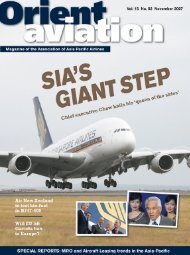
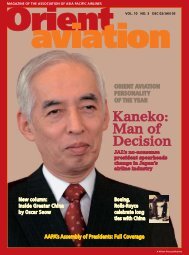
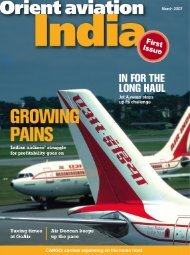
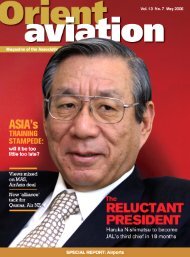
![OAMag-V7N4-Cover [Converted] - Orient Aviation](https://img.yumpu.com/48598575/1/190x255/oamag-v7n4-cover-converted-orient-aviation.jpg?quality=85)

